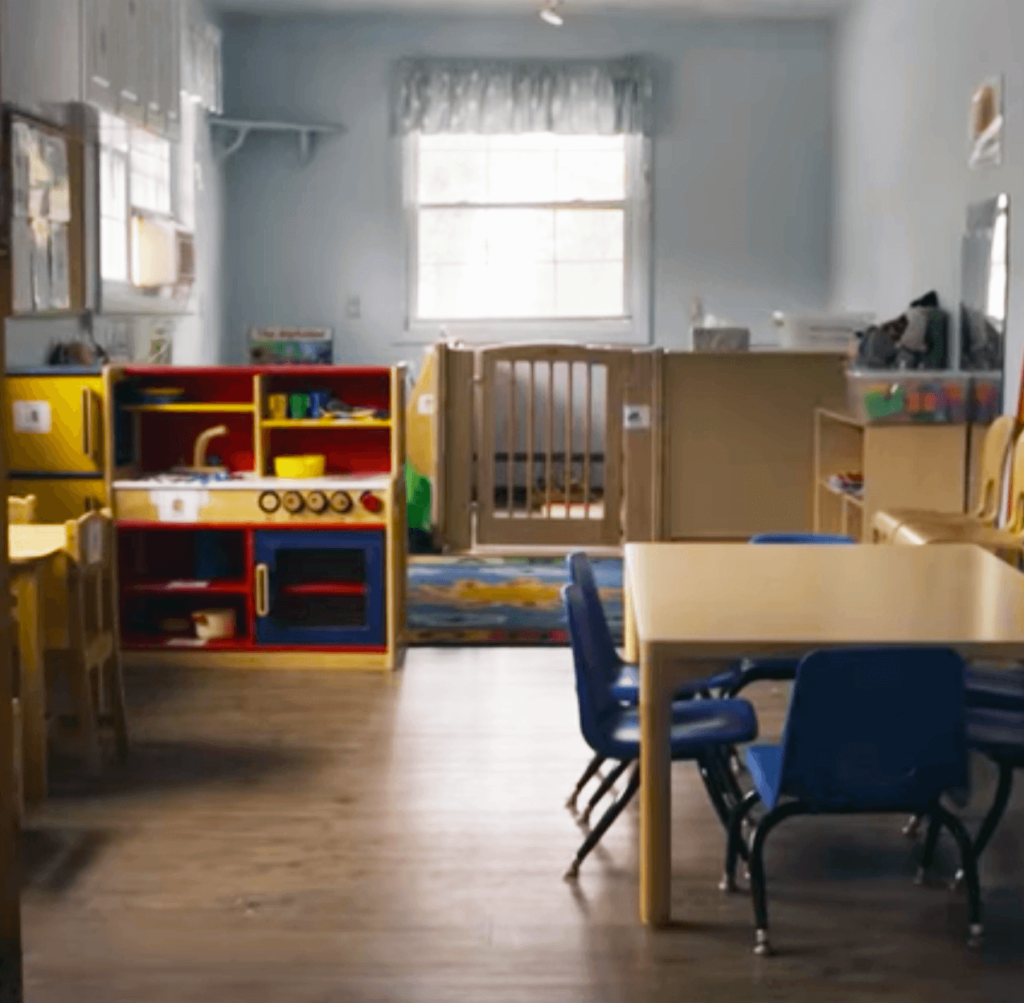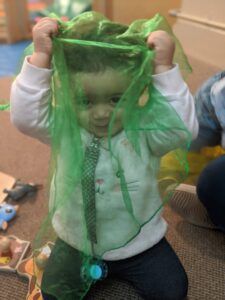Play is a natural instinct. Actively enjoying activities and engaging in surroundings can be traced through centuries and species.
“All mammals play – from cats and dogs to lions and tigers,” enthused Meghan Schafer, Horizons’ Southeast Region Playspace Program Director. “The larger and more complex the brain of the mammal, the more they need to play. Which means we as humans beings need to play a lot.“

Pictured: Meghan Schafer, Horizons’ Southeast Region Playspace Program Director in the Playspace.
Meghan’s passion for play is deep rooted in the science and history of its benefits for the human brain.
“In the first five years of life, 90% of the brain develops and so does the foundation of who you are as a person. In that time, play is how children interact and connect with the world.”
This concept is evident, no matter the time period or place in the world.
“Anthropologists studied hunter gatherer cultures and discovered that the ones allowing children to play from dawn to dusk were the most well-adjusted, smart, and resilient,” Meghan reflected. “Unfortunately play has declined over the years, and that has led to kids being less familiar with how to connect socially with others or learn how to build friendships and relationships. Through play, children develop critical thinking skills that teach them how to solve problems, not only their own roadblocks but the real world problems that come later in life.”
Horizons recognizes the powerful impact play has on childhood from both an educational and social-emotional perspective. Organizationally, the program works to provide a safe and playful environment for vulnerable children both through Early Education Centers and homeless shelter based Playspace Programs.
“The Horizons Playspace Program partners with family homeless shelters across the state to provide healing play for the children living at the shelters.” Meghan explained. “We do this by installing playrooms run by adult volunteers who provide weekly play opportunities for the children living there.”
The playrooms are outfitted with toys and supplies to create a fun and welcoming environment for the children, things like Playdough, blocks, and crafts – everything that should be a part of childhood but doesn’t always happen when living in a shelter setting.

“Our playrooms – called Playspaces – are designed around best practices in both early education and trauma-informed play. This is based on extensive research from Harvard University and the Center for Developing Child, and each Playspace is conducted around five distinct areas of play.”
Dramatic play features play kitchens, puppets, and costumes as a creative haven “where you can make your imagination run wild and be whoever you want to be.”
Literacy provides books for different ages, stages, and cultures. The section is enhanced with activities focused on reading and writing development.
Manipulatives are described as “using your hands to solve problems – board games, puzzles, trucks and cars – all tools to build on critical thinking skills.”
Arts and crafts are “where the kids get to explore their emotions through creativity and open-ending process artwork” using feathers, pompoms, paints, crayons, and markers to express their thoughts, emotions, and individuality.
Lastly, the infant area is a separate section within the Playspace for the shelter’s youngest residents. “A safe space to learn to sit up, roll over, crawl – all those wonderful first year of life milestones that are so needed. Our volunteers can help infants accomplish these vital skills in the safety of the Playspace environment.”
Beyond the benefits to the children, parents get to utilize the time their kids spend in Playspace for much needed adult-time, meeting with case managers, taking on-site classes, or simply having a moment to care for themselves. “We really try to work and benefit the whole family through the Playspace Program.” Meghan affirmed. “Parents living in shelters are often with their children for 24 hours a day. When their kids are in the Playspace, that’s their one chance to have adult conversations they may not want to have in front of their kids or just take a moment for their own mental health and care.”
The Playspace Program is always seeking committed volunteers to help make a difference for the families and young children living in shelter. “First and foremost, we look for volunteers who have a love for young children,” Meghan informed, stating that the Playspace Program doesn’t require complex degrees or an extensive list of experiences in childcare so long as the volunteers demonstrate their commitment to the wellbeing of the children and a passion for play. “Someone who is ready to be silly on the floor and isn’t afraid of the messy wonderful chaos that comes from playing with children is definitely a person who will do well and do really great things for our kids.”

Flexibility is also a valuable volunteer trait. “We look for someone who can go with the flow during playtime” she explained. “We want Playspace to be child driven, and someone who encourages the kids to be the arbiter of their imaginations while staying safe in their environment is key.”
“Ultimately, the most important thing we ask of our volunteers is to be committed to the kids,” Meghan emphasized. “We ask for a 6 months’ commitment of 2 hours a week. That consistency of a long term experience each and every week with the children is essential. It’s more important than the playroom and toys themselves – the ability for the kids to connect with a volunteer over time and know that they’ll be there helps them to learn to trust. It is critical to the healing aspect of our program.”
Household instability is often described as a traumatic experience for families, especially children. Social-emotional skills are a significant healing component developed in the Playspace with the help of volunteers. “Through play we help the kids to understand things like ‘How do I control my own body, my own voice?’ and ‘How do I understand my own emotions and what do I do when I feel out of those emotions?’” Meghan explained. “Simple things like molding playdough in your hands to work through frustrations, learning that a puppet can help you tell your story in a safe way, or how throwing a ball with another person can help you connect with that person – little things like that can really impact a child for the rest of their life.”
Horizons’ Playspace Program maintains over 90 shelter-based playrooms across the state of Massachusetts. Supported by donated funds and run by over a thousand weekly volunteers, Horizons’ Playspace Programs continue to provide children living in shelters a safe environment to do what children do best: explore their mind, body, emotions, and world through the natural instinct and power of play.
This piece was written by Andrea Drag, a regular contributor to Horizons’ Blog.